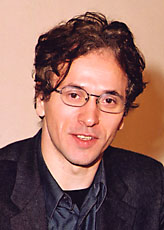8. Josef Penninger, Ph.D.,
professor, director IMBA
Institut für Molekulare Biotechnologie GmbH (IMBA)
Dr. Bohr-Gasse
1030 Vienna
Austria
Fax: +43 1 7904 4110
Email address: Josef.Penninger@imba.oeaw.ac.at
http://www.imba.oeaw.ac.at
Josef Penninger is the Scientific and Administrative Director of IMBA in Vienna, a new
and fully academic institute funded by the Austrian Government and the Academy of Sciences dedicated to
promote excellence. Apeiron Biologics has been founded by Josef Penninger, Vienna, and Borys Chabursky,
Toronto, Canada. Borys Chabursky was named one of the top 40 under 40 outstanding people in business and
science in Canada in 2002. Josef Penninger is Full Professor of Immunology and Medical Biophysics at the
University of Toronto, a Canada Research Chair Holder appointed by the prime Minister of Canada, and was
Principal Investigator at the Amgen Institute in Toronto where he closely worked with the world's largest
Biotechnology company Amgen. Since 2002, he. Josef Penninger was named Top 40 under 40 in Canada in 2000,
his laboratory was listed twice as top 10 lab in the world among all fields in science (according to impact
of work, ISI). The Penninger laboratory was also the first to identify the function of Vav1 as critical
regulator of immune synapse formation providing the first genetic validation that immune synapse formation
is essential for T cell function and his laboratory was the first to identify the role of the ubiquitin E3
ligase Cbl-b as critical regulator of autoimmunity (see references below). The mission of Apeiron Biologics
is to develop novel small molecule drugs against select targets for the control of autoimmune diseases such
as type I diabetes or asthma, the modulation of T cells and dendritic cells for cancer vaccination, and
for pain control.
Josef Penninger's expertise is genetic engineering in animals to study fundamental mechanisms of lymphocyte
biology and T cell tolerance. Multiple mutant mouse models have been generated that display T cell
development, T cell activation, and autoimmune phenotypes. For instance his group was the first to show
the essential role of immune synapse formation in T cell activation in a genetic model of Vav1 deficiency.
Vav1 regulates cytoskeletal changes and receptor clustering required for proliferation, death, cytokine
production, cell movement, and adherence to target cells. A novel Vav1-regulated signaling pathway has
been identified in T cells that communicates the TCR-signal to cell adhesion receptors. Moreover, they
described the role of FYB/SLAP130/ADAP in T cell functions and TCR-mediated cell adhesion. The group has
also found that T cells express a molecule called Cbl-b that functions as a gatekeeper of Vav1 activation.
Genetic modulation of Vav1/Cbl-b leads to TCR-mediated T cell activation in the absence of any CD28
costimulation. Cbl-b also controls IgE receptor recycling in mast cells and therefore mast cell
degranulation and allergic responses. Cbl-b mutant mice develop spontaneous autoimmune disease and
inflammation in multiple organs. Recent evidence shows that Cbl-b is critical to maintain immune
tolerance and mice that have a Cbl-b mutation cannot be tolerized and in fact die following repeated
immunization. Moreover, Cbl-b mutant mice develop spontaneous autoimmune diabetes in transgenic system
that is in line with a recent report that a Cbl-b mutation is the cause of diabetes in a rat model of
T1D. Thus, the E3 ubiquitin ligase Cbl-b appears to be a critical and essential regulator of immune
tolerance in vivo.
Appointed research fellows
Experienced researcher: John Trichereau, Canada
Appointed on the IMDEMI project from 1-1-2007 to 31-12-2008
Early stage researcher: Constance Richter, Gemany
Appointed on the IMDEMI project from 1-9-2005 to 31-5-2007
Early stage researcher: Blanka Pranjic, Croatia
Appointed on the IMDEMI project from 1-1-2009 to 31-5-2009
Publications originating from the
IMDEMI project
Imai Y, Kuba K, Neely GG,
Yaghubian-Malhami R, Perkmann T, van Loo G, Ermolaeva M, Veldhuizen R, Leung YH,
Wang H, Liu H, Sun Y, Pasparakis M, Kopf M, Mech C, Bavari S, Peiris JS,
Slutsky AS, Akira S, Hultqvist M, Holmdahl R, Nicholls J, Jiang C, Binder CJ,
Penninger JM. Identification of oxidative stress and Toll-like receptor 4
signaling as a key pathway of acute lung injury.
Cell 133: 235-249, 2008.
(PDF)
Publications Josef Penninger
(link to PubMed)
|

